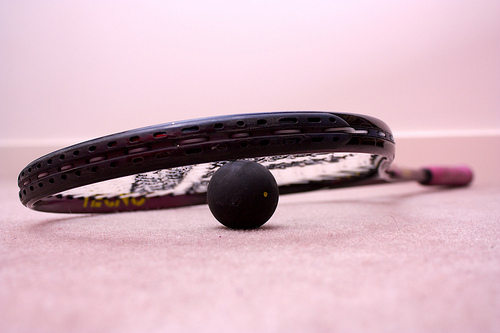
Squash is one of my favorite sports, although unfortunately plagued by frequent achilles tendon ruptures as all racket sports. The image is CC by penguincakes.
A recent meta-analysis comparing treatments for achilles tendon ruptures caught my eye. This is probably one of the most commonly debated injuries among young orthopaedic surgeons; “what would you do if you’re achilles ruptured?”. After a few beers we can keep at it for hours… Maybe we can finally move to more interesting topics after Soroceanu et al’s excellent article.
The meta-analysis is well thought through/executed:
- A wide screening of databases
- A scanning of the reference lists of included articles
- A search through proceedings of relevant meetings from 2005 to 2011 to identify unpublished reports
- Foreign language articles were translated
Results
Their main conclusion was that if an accelerated functional rehabilitation protocol was used there was no difference in re-rupture rates while there was an almost 4 times greater risk of complications after surgery. The complication consisted mainly of:
- Infections – both deep and superficial
- Necrosis – both skin and tendon
- Fistulas
- Scar adhesion
- Sural nerve damage
- Decreased ankle motion
- Overlengthening of the tendon
- Deep venous thrombosis and pulmonary embolus
A few thoughts
I’m a little dissapointed that the article wasn’t more detailed. I know it’s nice to have short articles but a more detailed description of the study methodology should be available. Some thoughts that dwell in my mind:
- What is the definition of function early range of motion, the only mentioning is in the introduction:
… functional bracing and modified postoperative regimens allow patients to perform daily active plantar flexion exercises as soon as ten days following injury.
- It would be interesting to see a funnel plot with the studies. It is a very thorough literature search and it would be nice to see if there is any indication of residual publication bias. The authors mention this in the methodology but I guess it never made it to print.
- The most interesting plot is in my opinion figure 3, but why didn’t they enhance it by adding headlines instead of 0/1 – a reader should not have to read the subtext to be sure which group is 1 and which is 0. It would also be nice to have some color indicating the subgroups.
You can find the article here:
The protocol for accelerated functional rehabilitation
The rehabilitation protocol for the non-operative accelerated functional rehabilitation according to Willis et al:
- 0-2 weeks
- Posterior slab/splint
- 2-4 weeks
- Aircast walking boot with 2-cm heel lift
- Crutches
- Active plantar flexion and dorsiflexion to neutral, inversion/eversion below neutral
- Knee/hip exercises with no ankle involvement
- Non-weight-bearing fitness/cardiovascular exercises
- Hydrotherapy
- 4-6 weeks
- Weight-bearing as tolerated
- 6-8 weeks
- Remove heel lift
- Dorsiflexion stretching, slowly
- Graduated resistance exercises
- Proprioceptive and gait retraining
- > 12 weeks
- Sport-specific retraining
It was surprisingly hard to deduce exactly what the protocol was for the surgical/non-surgical treatments, as they were mixed into one table column. I’m stuck with the question; Why this minimalistic approach, what are the costs for including a table that motivate a supplement only available on the web?
